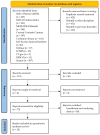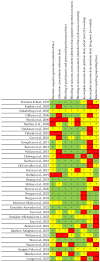Triathlon: Ergo Nutrition for Training, Competing, and Recovering
- PMID: 40507114
- PMCID: PMC12157197
- DOI: 10.3390/nu17111846
Triathlon: Ergo Nutrition for Training, Competing, and Recovering
Abstract
Triathlon is a multi-sport event that combines swimming, cycling and running. The distances vary and the physiological demands are high. Objectives: This review compiles information on nutritional strategies and ergogenic supplements for triathlon training, competition and recovery. It aims to provide an understanding of the specific challenges and needs of the sport to help triathletes and coaches optimise performance through effective training and nutrition plans. Methods: English-language publications were searched using the keywords triathlon, nutrition, recovery and ergogenic aids, alone or in combination, in databases. Results: Maintaining good glycogen levels, consuming enough carbohydrates and staying properly hydrated are key to athletic performance, especially for triathletes. Education regarding nutrition, the role of probiotics and supplements, and diet modification for the enhancement of performance and recovery are pivotal considerations. Conclusions: Triathletes are at risk of RED-S due to negative energy balance and high fibre/plant protein diets, especially women. Optimising muscle glycogen through tailored diet and training, especially pre- and in-race nutrition, including carbohydrate loading and hydration strategies, is critical. Education is needed to improve post-exercise nutrition, while probiotics and certain supplements may aid performance and recovery. Dietary support is important for resistance training to optimise performance and recovery.
Keywords: energy demands; ergogenic aids; nutrition; recovery; triathlon.
Conflict of interest statement
The researchers declare that they have no monetary or non-monetary connections to any entity that supports their investigation, takes part in conversations about the subject, or supplies materials for this study.
Figures





Similar articles
-
Endurance in Long-Distance Swimming and the Use of Nutritional Aids.Nutrients. 2024 Nov 19;16(22):3949. doi: 10.3390/nu16223949. Nutrients. 2024. PMID: 39599736 Free PMC article. Review.
-
Substrate Metabolism During Ironman Triathlon: Different Horses on the Same Courses.Sports Med. 2018 Oct;48(10):2219-2226. doi: 10.1007/s40279-018-0938-9. Sports Med. 2018. PMID: 29777386
-
Maximising performance in triathlon: applied physiological and nutritional aspects of elite and non-elite competitions.J Sci Med Sport. 2008 Jul;11(4):407-16. doi: 10.1016/j.jsams.2007.07.010. Epub 2007 Sep 14. J Sci Med Sport. 2008. PMID: 17869183 Review.
-
Fueling the Triathlete: Evidence-Based Practical Advice for Athletes of All Levels.Curr Sports Med Rep. 2017 Jul/Aug;16(4):240-246. doi: 10.1249/JSR.0000000000000386. Curr Sports Med Rep. 2017. PMID: 28696986 Review.
-
Trends in Triathlon Performance: Effects of Sex and Age.Sports Med. 2013 Sep;43(9):851-63. doi: 10.1007/s40279-013-0067-4. Sports Med. 2013. PMID: 23797729 Review.
References
-
- Sharma A.P., Périard J.D. Triathlon Medicine. Springer; Cham, Switzerland: 2020. Physiological Requirements of the Different Distances of Triathlon; pp. 5–17. - DOI
-
- Baldwin K.M., Badenhorst C.E., Cripps A.J., Landers G.J., Merrells R.J., Bulsara M.K., Hoyne G.F. Strength Training for Long-Distance Triathletes: Theory to Practice. Strength Cond. J. 2022;44:1–14. doi: 10.1519/SSC.0000000000000660. - DOI
-
- Prieto-González P., Sedlacek J. Effects of Running-Specific Strength Training, Endurance Training, and Concurrent Training on Recreational Endurance Athletes’ Performance and Selected Anthropometric Parameters. Int. J. Environ. Res. Public Health. 2022;19:10773. doi: 10.3390/ijerph191710773. - DOI - PMC - PubMed
Publication types
MeSH terms
Substances
LinkOut - more resources
Full Text Sources

